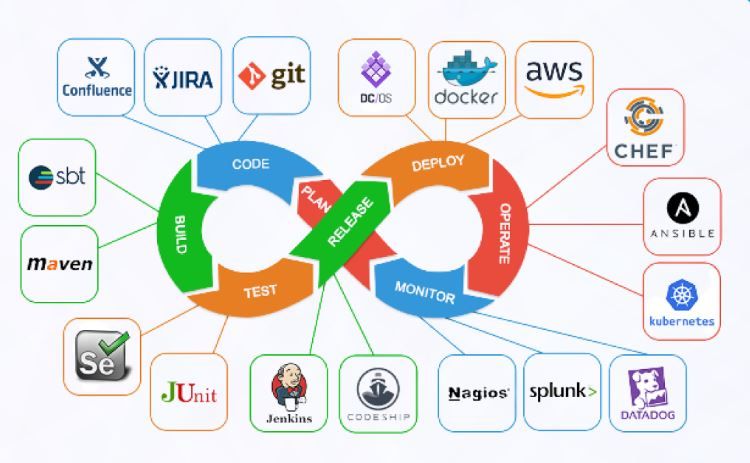CKA vs CKAD vs CKS – What is the Difference
According to recent statistics, there has been a 127% increase in the number of Kubernetes clusters hosted in the cloud in 2022. This indicates the growing popularity and adoption of Kubernetes as a container orchestration platform.
In this article, we'll look at the Kubernetes certifications offered by the Cloud Native Computing Foundation (CNCF).
Welcome to KodeKloud!
We are the #1 DevOps courses provider. Register today to gain access to the richest collection of DevOps courses and labs and try sample lessons of all our courses.
No credit card required!
What is Kubernetes?
It is an open-source container orchestration tool. It has become the standard for managing containerized applications at scale. Consequently, many companies have adopted Kubernetes, leading to an upsurge in the demand for professionals who can deploy, manage, and resolve issues with Kubernetes clusters. This has resulted in higher salaries and abundant job opportunities for Kubernetes experts, making it a highly desired skill-set in the tech industry.
See our blog: Salaries for Kubernetes jobs in Q1 2023
Try the Kubernetes Services Lab for free

Kubernetes Certification
Kubernetes certifications are very important in today's competitive job market. They validate a candidate's proficiency in deploying, managing, and troubleshooting Kubernetes clusters. Obtaining a certification can be an excellent way to demonstrate to potential employers that you possess the necessary expertise to work with Kubernetes, thereby enhancing your job prospects.
Moreover, Kubernetes certifications are updated regularly to reflect the latest developments in the Kubernetes ecosystem. Therefore, it is an effective way to stay up-to-date with the latest features and best practices.
The Cloud Native Computing Foundation (CNCF) offers multiple Kubernetes certifications:
- Certified Kubernetes Application Developer (CKAD): Validates technical skills in building and deploying applications
- Certified Kubernetes Administrator (CKA): Validates technical skills in general maintenance and management of entire Kubernetes clusters
- Certified Kubernetes Security (CKS): Validates technical skills in securing containers and the cluster.
- Kubernetes and Cloud Native Associate (KCNA): A pre-professional certification that validates one's understanding of Kubernetes and cloud-native technologies.
Let's now look at what each of these certifications entails.
Certified Kubernetes Administrator (CKA)
The certification validates knowledge on how to install, configure, and manage production-grade Kubernetes clusters. Some of the concepts covered during the certification program include:
- Networking
- Storage
- Security
- Maintenance
- Logging and Monitoring
- Application Lifecycle Management
- API Object Primitives
- Troubleshooting
- Establishing Use Cases for End-Users
It is suitable for Cloud Administrators, Kubernetes Administrators, and any IT administrators responsible for managing Kubernetes-based clusters. Besides establishing your credibility, earning a CKA certification helps improve your value in the job market.
To help you prepare for the CKAD exams, KodeKloud has an amazing exam preparation course.
Certified Kubernetes Application Developer (CKAD)
The Certified Kubernetes Application Developer (CKAD) certification is ideal for developers seeking to showcase their competence in developing, deploying, and designing cloud-native applications on Kubernetes.
The CKAD examination is a hands-on, performance-based assessment that evaluates a candidate's ability to write and deploy Kubernetes applications using common programming languages and tools. The test encompasses a broad range of topics, including Kubernetes architecture, fundamental concepts, workload scheduling and management, and troubleshooting.
Acquiring the CKAD certification is an excellent method to demonstrate your skills and expertise in creating cloud-native applications on Kubernetes to prospective employers. It can also help you distinguish yourself from other applicants when applying for Kubernetes-related developer positions, potentially resulting in higher salaries and better job prospects.
To help you prepare for the CKAD exams, KodeKloud has an amazing exam preparation course.
Certified Kubernetes Security (CKS)
The CKS certification is intended to validate a candidate's knowledge and proficiency in securing Kubernetes clusters and containerized applications. The exam covers a broad range of topics related to Kubernetes security best practices, including cluster setup, Kubernetes security, secure container lifecycle management, security auditing and monitoring, network security, and security tool utilization.
The first topic, cluster setup, involves configuring Kubernetes clusters with security in mind, such as configuring network policies, securing etcd, and using secure communications.
The second topic, cluster hardening, ensures that the candidate understands the Kubernetes security model, including pod security policies, service accounts, and role-based access controls (RBAC).
The third topic, secure container lifecycle management, emphasizes the importance of securely building, deploying, and managing container images and containers using Kubernetes best practices.
The fourth topic, security auditing and monitoring, involves performing security audits and monitoring Kubernetes clusters for security vulnerabilities.
The fifth topic, network security, covers securing Kubernetes network traffic with network policies and other security mechanisms.
The sixth topic, security tools, includes understanding how to use Kubernetes security tools such as Falco, Sysdig, and other security-related add-ons.
Obtaining the CKS certification can demonstrate to potential employers that the candidate has the necessary skills and expertise to secure Kubernetes clusters and containerized applications, making them a valuable asset to any organization that uses Kubernetes.
To help you prepare for the CKS exams, KodeKloud has an amazing exam preparation course.
Kubernetes and Cloud Native Associate (KCNA)
Kubernetes and cloud-native architecture are essential components of modern cloud computing, providing organizations with the flexibility and agility they need to thrive in a rapidly changing digital landscape. KNCA is a pre-professional certification designed for candidates interested in advancing professionally through a demonstrated understanding of Kubernetes foundational knowledge and skills. This certification is ideal for students learning about or candidates interested in working with cloud-native technologies.
To help you prepare for the KCNA exams, KodeKloud has an amazing exam preparation course.
Benefits of Obtaining Kubernetes Certifications
Obtaining Kubernetes certifications can bring many advantages for professionals aiming to advance their careers in the field of containerization. These include:
- Skills validation: Kubernetes certifications validate a candidate's knowledge and expertise in deploying, managing, and troubleshooting Kubernetes clusters. This helps candidates stand out in the job market and demonstrate their commitment to professional development.
- Improved job prospects: As more companies adopt Kubernetes, the demand for skilled professionals who can manage and troubleshoot Kubernetes clusters is increasing. Obtaining Kubernetes certifications can make candidates more attractive to potential employers and increase their job prospects.
- Increased earning potential: The certifications can lead to higher salaries and better job opportunities, as companies are willing to pay a premium for candidates with validated Kubernetes expertise.
- Staying up-to-date: The certifications are updated regularly to reflect the latest features and best practices in the Kubernetes ecosystem. This helps professionals stay up-to-date with the latest developments in the field and improve their knowledge and skills.
- Community engagement: The certifications are recognized by the Kubernetes community as a sign of expertise, which can help professionals engage with the wider Kubernetes community. This can lead to new opportunities for learning, networking, and collaboration within the industry.
Conclusion
There are currently three certifications - CKA, CKAD, and CKS - that are offered by the Linux Foundation, that validate a person's Kubernetes skills. Obtaining these certifications can improve your job prospects and increase your salary potential. Additionally, staying up-to-date with the latest Kubernetes developments can help you stay competitive in the job market.

Empower Yourself with KodeKloud!
Over One Million students have taken KodeKloud DevOps Courses!
Supercharge your DevOps Journey with us. Our 65+ expertly crafted courses cover all aspects of DevOps, ensuring you gain a solid understanding of the most sought-after skills in the industry. Our highly experienced, dedicated, and hard-working trainers go to great lengths to ensure that DevOps is made simple to understand.
